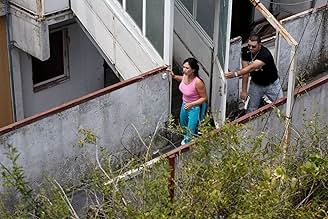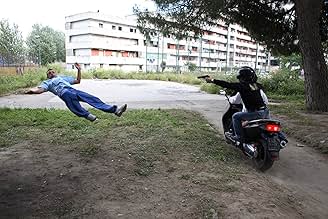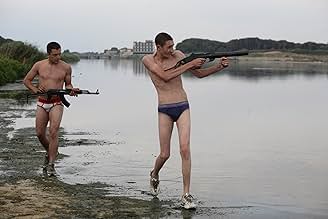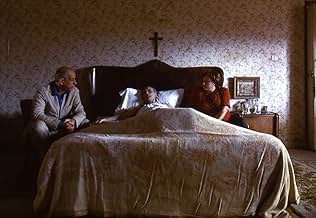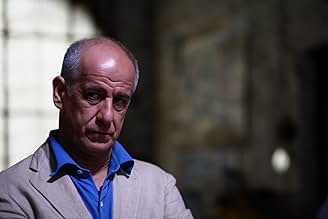Gomorra
- 2008
- Tous publics
- 2h 17m
IMDb RATING
7.0/10
52K
YOUR RATING
Scampia Vele is the Corbusian architecture which has become a stronghold for Mafia of Naples, Italy.Scampia Vele is the Corbusian architecture which has become a stronghold for Mafia of Naples, Italy.Scampia Vele is the Corbusian architecture which has become a stronghold for Mafia of Naples, Italy.
- Nominated for 1 BAFTA Award
- 34 wins & 42 nominations total
Salvatore Abbruzzese
- Totò
- (as Salvatore Abruzzese)
Vincenzo Altamura
- Gaetano
- (as Gaetano Altamura)
Featured reviews
Some publications gave Gomorra a perfect rating, while others gave more basic reviews but, in a week where The Times reviewed about 10 new releases and gave this 5 stars and everything else 1 or 2, I decided this was a film I should check out and that The House Bunny could perhaps wait for another time (specifically, when it is the last film on Earth). Gomorra opens with a beauty salon hit which I imagine is meant to introduce us to the violent and treacherous world of the Cammora crime syndicate in the locality of Naples, Italy. As an impacting opening, it does work but the "introduction" idea is sadly where the film is roundly weak and it does mean that it has the potential to confuse.
Before I get a barrage of messages pointing out to me that cousins shouldn't marry, I do not mean that I could not follow the specific threads of the film but just that the film offers nothing to inform the new viewer of the world that we are about to enter. I'm not sure the best of doing this but certainly at first I didn't totally appreciate the scale of the organisation, the structure or the setting and it took me a minute as a result to get into the stories. Unlike similar films, the separate threads never really come together in any way other than they share a grounding in location and the problem of the Cammora. Outside of a specific introduction for those coming in cold, the film does give a sort of introduction to the problem as we first follow one of the characters around the nightmarish, enclosed estate of flats which seems to perform the task of judge and prison-officer as those born into it have little opportunity to escape it and essentially have their fate sealed by virtue of their environment.
Within this feat of architecture we follow several threads including a money-man, a boy getting into the life on the lowest rung, a man starting out in the corrupt world of waste management, a black-market tailor looking to earn a bit more on the side and two young men who decide to seize power in their region from the old, fat men who sit at the top. In terms of engagement, there isn't really a huge emotional draw within the film but instead it all feels very realistic and dead - so it is not so much that you feel for the specific characters so much as you have a constant sense of hopelessness and of how small and petty it all it. This is not the Italian gangsterisms of The Godfather where there is a certain sense of class and aspiration, in Gomorra the top men are trapped in the world the same as everyone else - with more money perhaps but they are not living in mansions or controlling things from a tropical island. The delivery of the film helps this as it is well shot on location and has a hand-held feel of grit and dirt. I didn't really like the technique employed throughout where the focus was on the subject in the close foreground and everything else was blurred, even as it came into play in the scene but otherwise it was well done, with the sudden moments of violence made more impacting by not being seen due to confusion simulated in the camera or by quick editing.
Gomorra has been compared to City of God, Goodfellas and all the other crime films that get wheeled out for reviews. In most ways this is not really a fair description because Gomorra does not have the style and flair of those films, nor do all the narrative threads come together neatly in the way we have come to expect. However it is still an engagingly bleak and realistic look into the world of the Cammora that is well done even if it has flaws. It is not "enjoyable" per se due to the lack of flair, but it is a very good film nonetheless and, like City of God did with City of Men, it offers the potential for a mini-series to further explore and find stories from within this world.
Before I get a barrage of messages pointing out to me that cousins shouldn't marry, I do not mean that I could not follow the specific threads of the film but just that the film offers nothing to inform the new viewer of the world that we are about to enter. I'm not sure the best of doing this but certainly at first I didn't totally appreciate the scale of the organisation, the structure or the setting and it took me a minute as a result to get into the stories. Unlike similar films, the separate threads never really come together in any way other than they share a grounding in location and the problem of the Cammora. Outside of a specific introduction for those coming in cold, the film does give a sort of introduction to the problem as we first follow one of the characters around the nightmarish, enclosed estate of flats which seems to perform the task of judge and prison-officer as those born into it have little opportunity to escape it and essentially have their fate sealed by virtue of their environment.
Within this feat of architecture we follow several threads including a money-man, a boy getting into the life on the lowest rung, a man starting out in the corrupt world of waste management, a black-market tailor looking to earn a bit more on the side and two young men who decide to seize power in their region from the old, fat men who sit at the top. In terms of engagement, there isn't really a huge emotional draw within the film but instead it all feels very realistic and dead - so it is not so much that you feel for the specific characters so much as you have a constant sense of hopelessness and of how small and petty it all it. This is not the Italian gangsterisms of The Godfather where there is a certain sense of class and aspiration, in Gomorra the top men are trapped in the world the same as everyone else - with more money perhaps but they are not living in mansions or controlling things from a tropical island. The delivery of the film helps this as it is well shot on location and has a hand-held feel of grit and dirt. I didn't really like the technique employed throughout where the focus was on the subject in the close foreground and everything else was blurred, even as it came into play in the scene but otherwise it was well done, with the sudden moments of violence made more impacting by not being seen due to confusion simulated in the camera or by quick editing.
Gomorra has been compared to City of God, Goodfellas and all the other crime films that get wheeled out for reviews. In most ways this is not really a fair description because Gomorra does not have the style and flair of those films, nor do all the narrative threads come together neatly in the way we have come to expect. However it is still an engagingly bleak and realistic look into the world of the Cammora that is well done even if it has flaws. It is not "enjoyable" per se due to the lack of flair, but it is a very good film nonetheless and, like City of God did with City of Men, it offers the potential for a mini-series to further explore and find stories from within this world.
A realistic film about the Neapolitan Mafia, The movie has a documentary touch which i really liked the most, the ending is perfect and real.
A must-see!
because, at the first sigh, nothing could be new. after many films about gangsters, crimes, South Italy, for the viewer must be clear the entire story. Gomorrah is an exception. for many reasons. first, because it is a real admirable work. then, because it is more than a story about murder and victims but a precise perspective about a large and complex mechanism. not the last, because it is the portrait of society as a collection of masks, sides and silences. and this does it more a support for reflection than entertainment in ordinary sense. the exploration of a huge labyrinth. in the middle of spider web.
The unglamourous reality of the workings of organised crime in Italy are revealed in this grim, thinly fictionalised story. There's no glamour here: just a form of business in which violence is an institutionalised part, a shadow state, in effect, only with a high rate of marginal taxation, a strong line on punishment, and no policy for the common welfare. The reality of how it feels to grow up in such an environment is plausibly conveyed. What we don't see, perhaps unsurprisingly, is too much sign of anyone showing heart; and in consequence, it's a bit hard to get into the story, and care for the mostly unsympathetic characters we meet. 'Gomorrah' isn't a great film; but it is a useful corrective against the myths of Hollywood, albeit one with a rather depressing view into one particular corner of the world.
Garners more respect than a spot on favorites list, "Gomorra" chronicles five seemingly disconnected stories with one thing in common: all are heavily influenced by a criminal organization run by the Camorras, an ominous mafia organization with a tight grip on Naples, Italy. Stylishly delivered, with extra kudos on editing and cinematography, Film will no doubt attract fans of the violent underworld, but might be disappointed by its verite approach, even if it perfectly captures reality, as such. Absolute antithesis to depiction from the American mafia, film is gritty and has zero entertainment value but in retrospect, picture was produced with such depressing intentions.
Multi plot film features more on characters attracted by the allure of the Camorras than the Camorras themselves. The five stories were plucked out from a novel by Roberto Saviano: the non-fiction that thrived on the best seller's list in Italy. Stories range from a coming of age teenager wanting to be identified with the mafia to a fresh university graduate looking for a promising vocation. Through varying levels of perspectives: from the violent eyed to the diplomatic, "Gomorra" stuns as it lists the organization's almost totalitarian control over the underbelly of Italy. It creates the impression of a country rotting from the inside out. With each story written by a different writer, what could have been an interconnection disaster is controlled well by director Matteo Garrone.
Ambitiously edited, fine balance between chaos and narrative is clearly defined by Marco Spoletini. First 40 minutes won't bode well for viewers looking for an easy diversion, as it is edited to confusion creating the illusion that the film started midway. Nonetheless, the stories do emerge, to great relief and from there on out, film would have established its style to a keen audience.
Cinematography, too is top notch. Marco Onorato paints Italy with a dull set of colors, resembling more of a third world purgatory rather than a honeymooner's travel brochure. Even Venice's bright reds and blues are muted with grey and brown with a hint of overexposure. Overall effect adds stupendously to the film as it gives it a sense of space and absolutely squashes any sense of hope an over-reader might derive.
Accuracy is greatly appreciated here. Film tries to blurry lines between dramatic film and documentary with impressive results. Details are all intact: dialogue is accurately more dialect derived, shooting locations seem extracted from a news clip and most thesping is done on dead-on accuracy by first timers.
With production values on stratospheric levels, film's overall intention is transparent: absolutely naught empathy is allowed, allowing audiences to soak in the moody atmosphere and simply co-exist with the protagonists clearly tested by circumstance. This will be its main predicament in garnering a more universal success as it asks a lot from an audience whose expectations might lean towards the slick of "Cidade de Deus".
With everything into consideration, film is too well choreographed that it becomes as intimidating as the organization that it exposes. Multiple plays won't be troublesome as every single detail here has a sense of subtext of tragedy unwilling to be diluted by repetition. However, might only be uncovered by fans willing to revisit.
Picture won the Grand Prize of the 2008 Cannes Film Festival.
Multi plot film features more on characters attracted by the allure of the Camorras than the Camorras themselves. The five stories were plucked out from a novel by Roberto Saviano: the non-fiction that thrived on the best seller's list in Italy. Stories range from a coming of age teenager wanting to be identified with the mafia to a fresh university graduate looking for a promising vocation. Through varying levels of perspectives: from the violent eyed to the diplomatic, "Gomorra" stuns as it lists the organization's almost totalitarian control over the underbelly of Italy. It creates the impression of a country rotting from the inside out. With each story written by a different writer, what could have been an interconnection disaster is controlled well by director Matteo Garrone.
Ambitiously edited, fine balance between chaos and narrative is clearly defined by Marco Spoletini. First 40 minutes won't bode well for viewers looking for an easy diversion, as it is edited to confusion creating the illusion that the film started midway. Nonetheless, the stories do emerge, to great relief and from there on out, film would have established its style to a keen audience.
Cinematography, too is top notch. Marco Onorato paints Italy with a dull set of colors, resembling more of a third world purgatory rather than a honeymooner's travel brochure. Even Venice's bright reds and blues are muted with grey and brown with a hint of overexposure. Overall effect adds stupendously to the film as it gives it a sense of space and absolutely squashes any sense of hope an over-reader might derive.
Accuracy is greatly appreciated here. Film tries to blurry lines between dramatic film and documentary with impressive results. Details are all intact: dialogue is accurately more dialect derived, shooting locations seem extracted from a news clip and most thesping is done on dead-on accuracy by first timers.
With production values on stratospheric levels, film's overall intention is transparent: absolutely naught empathy is allowed, allowing audiences to soak in the moody atmosphere and simply co-exist with the protagonists clearly tested by circumstance. This will be its main predicament in garnering a more universal success as it asks a lot from an audience whose expectations might lean towards the slick of "Cidade de Deus".
With everything into consideration, film is too well choreographed that it becomes as intimidating as the organization that it exposes. Multiple plays won't be troublesome as every single detail here has a sense of subtext of tragedy unwilling to be diluted by repetition. However, might only be uncovered by fans willing to revisit.
Picture won the Grand Prize of the 2008 Cannes Film Festival.
Did you know
- TriviaRoberto Saviano got death threats from the Camorra for exposing their activities in the novel and movie, and is now permanently under police protection.
- GoofsAt the beginning of the movie you can clearly see the character named Amerigo belly moving, when his dead body remains on the chair, where he has been having his nails cut.
- Alternate versionsIn 2020 Matteo Garrone re-cut the movie, reducing the length to 125 minutes.
- ConnectionsFeatured in De wereld draait door: Episode #4.31 (2008)
- SoundtracksHerculaneum
Written by Robert Del Naja and Neil Davidge
Performed by Massive Attack
Additional programming by Euan Dickinson
Courtesy of One Point Six
Details
Box office
- Gross US & Canada
- $1,579,146
- Opening weekend US & Canada
- $5,532
- Dec 21, 2008
- Gross worldwide
- $34,861,529
- Runtime2 hours 17 minutes
- Color
- Sound mix
- Aspect ratio
- 2.35 : 1
Contribute to this page
Suggest an edit or add missing content


![Watch Trailer originale italiano [OV]](https://m.media-amazon.com/images/M/MV5BMjYxMDk3OTItZDQxNC00MTlkLTlkNGYtZWVhMzgzM2M5NWFmXkEyXkFqcGdeQXRyYW5zY29kZS13b3JrZmxvdw@@._V1_QL75_UY281_CR13)


